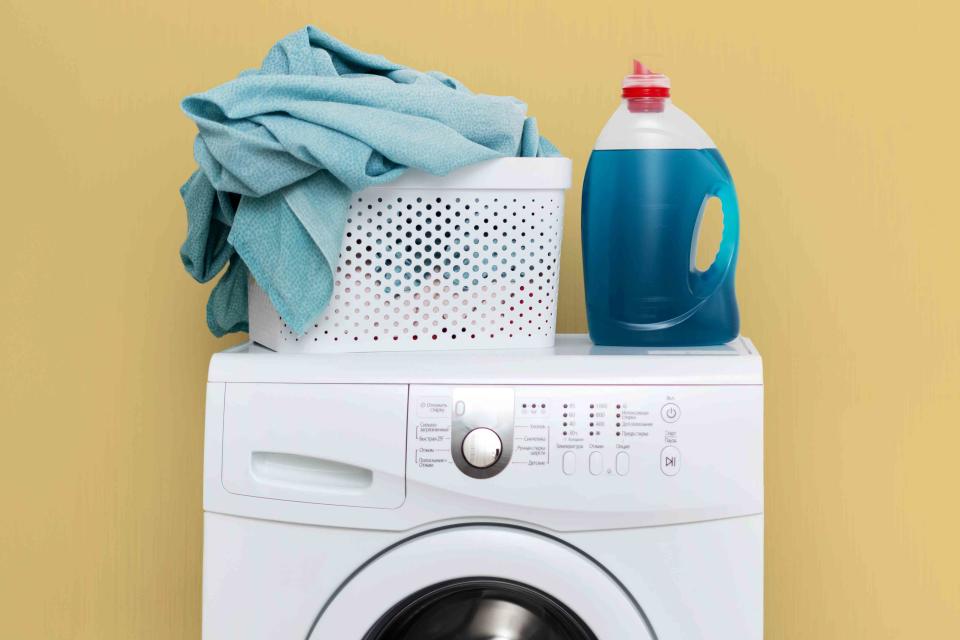Should You Wash Bed Sheets in Hot Water?
Will hot temperatures ruin your bedding?

Brizmaker/Getty Images
Your bedding can get pretty gross, pretty fast. Think sweat, oils, dead skin cells, perhaps a little pet dander and fur....and other kinds of ick. Which means you're probably thinking you might want to wash your bed sheets in hot water (perhaps boiling?) to help keep them clean.
Related: This Is How Often You Should Wash Your Sheets, According to MDs
But the answer to cleaner sheets isn't necessarily running them on sanitize every time you wash them. And in fact, for many bed sheets, a warm or cool cycle will work just as well as a hot one at getting them clean and fresh. Here's what you need to know about cleaning your bedding properly, and when to break out the hot water for your bed sheets. (Spoiler alert: You likely don't need to use the hot water wash every time!)
What Temperature Should You Use for Washing Your Sheets?
The short answer: Check the care label! The very best way to determine the proper washing temperature for your sheets is to look at the care label or instructions. That way, you understand the ideal temperature range for your sheets.
But if that tag has disappeared, the ideal temperature range for washing your bedding depends on what material your sheets are made of, and the color of bedding you've picked.
Some bedding materials, such as cotton, are more hardy and can stand up to a hot water wash. If you have delicate silk sheets, though, you'll want to stick to with cooler temperatures to avoid damaging your bedding.
Bedding Material | Laundry Temperature |
Bamboo | cold |
Blended Fabrics | warm |
Cotton | all temperatures, warm preferred |
Linen | warm |
Microfiber/Polyester | warm |
Silk | cold |
Tencel | cold |
Related: You're Probably Washing Your Laundry at the Wrong Temperature—Here's Why
Warmer temperatures can also cause brightly colored sheets to fade more quickly, so you'll want to stick to the cooler end of the spectrum for them.
Hot water can be hard on fabrics, causing them to shrink and reducing their longevity, so use hot water sparingly in your bedding laundry routine.
And of course, a hot water washing cycle uses more energy than a warm or cool wash, so it can increase your energy bills and your environmental impact.
When to Use a Hot Water Wash for Your Sheets
There may be times where washing your sheets in hot water (or at least, hotter water) will be your best bet—even if it means that your bedding fades faster. Here are a few instances when washing your bedding in hot water may be your best bet.
Related: Here's Exactly When You Should Sanitize Your Laundry—Plus, How to Do It
If the person who used the sheets was sick
A hot water wash, especially when paired with a sanitizing detergent (such as an oxygen bleach) or with chlorine bleach can help kill off even the most stubborn bacteria and viruses, such as salmonella and rotavirus. The heat of the dryer also plays a key part in reducing the pathogens on your bedding, so make sure you run your sheets through the dryer until they're fully dry.
If you had a head lice or bed bug infestation
Yep, hot water can kill those critters pretty quickly and efficiently. Run bedding that is potentially infested with either bed bugs or lice through the hottest washing cycle possible—then run them through the hottest drying cycle, too.
If someone in your family has a dust mite allergy
Some studies have shown that even cold or warm water washing with detergent does a good job of removing dust mites and the allergens they produce—removing up to 83 percent of the live mites. But many health experts still recommend a hot-water wash for bed sheets weekly to remove as many dust mites and allergens as possible.
Use bedding that can handle hot water for people with dust mite allergens
Cotton bedding may be the best choice for people who have dust mite allergies, as it can be laundered in hot water.
Related: Allergies Going Haywire? Here's How to Create an Allergy-Proof Bedroom
For certain stains
Some stains will come clean more easily if washed in hot water. For instance, if that breakfast in bed went awry and you're dealing with coffee stains in your bedding, a hot water wash (after pre-treating the stain) is the way to go. Keep in mind, though, that many common bed sheet stains—like protein-based blood stains—can actually set in for good if they're washed in hot water, so you'll want to use a cold-water wash to remove them.
For more Real Simple news, make sure to sign up for our newsletter!
Read the original article on Real Simple.

